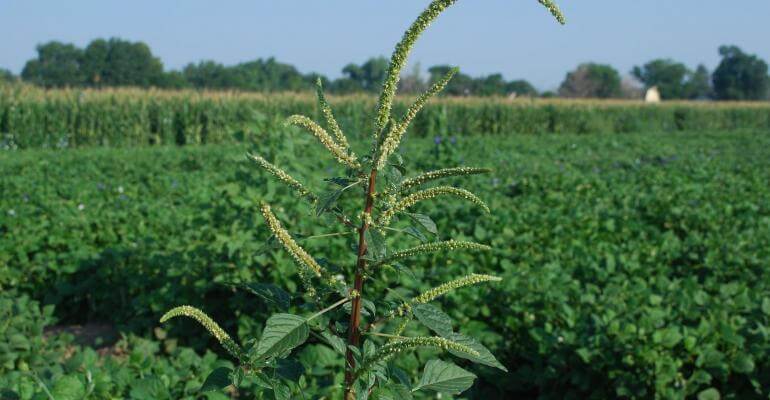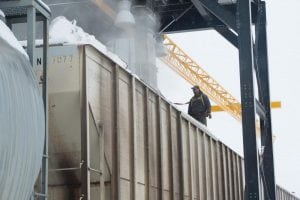MSB encourages Farmers to Win the War on Weeds with Workshop and Farm Tools
As weeds take a greater toll on crop yields, the Maryland Soybean Board (MSB) is encouraging Mid-Atlantic farmers to take action to prevent the spread of herbicide resistant weeds.
“If weeds are identified in their earliest stages, we can make a plan to control them before they overtake a field,” stated Brian Johnson, chair of the MSB Research Committee. “We are investing in research to assist farmers in combating the issue and improving yields on the farm, and then relaying that information to the farmer.”

Weed control is a top priority for the soybean board, as it impacts the health of the soil as well as crop yields. The soybean growers now offer a herbicide lookup app that farmers can use to identify weeds in the field. This is available at www.iwilltakeaction.com, along with additional tools in weed management.
MSB has teamed up with the University of Maryland Extension to offer workshops for farmers interested in learning about herbicide resistant weeds and improve weed control on their farms. As the spread of these weeds continue in the Mid-Atlantic, it is imperative for landowners to learn management strategies that will help control the weeds.
Herbicide Weed Management Workshops run 8:00 am to 1:00 pm and will cover integrated weed management tactics; Palmer amaranth, common ragweed and marestail control strategies; and developing a weed management plan. There is no charge to attend and lunch will be provided. Pesticide (commercial and private) and CCA continuing education credits will be offered. Farmers are requested to RSVP to provide an accurate meal count.
• February 26: St. Mary’s County UME Office, 26737 Radio Station Way, Leonardtown. Call St. Mary’s County UME Office, 301-475-4484.
• March 4: Harrington Volunteer Fire Company, 20 Clark St, Harrington. Call UD Carvel REC, 302-856-2585 (ext 540).
• March 5: Somerset Extension Office, 30730 Park Drive, Princess Anne. Call Somerset County UME Office, 410-651-1350.
• March 6: Frederick County UME Office, 330 Montevue Lane, Frederick. Call Frederick County UME Office, 301-600-3576.
• March 7: Chestertown Volunteer Fire Company, 211 Maple Ave, Chestertown. Call Kent County UME Office, 410-778-1661.
For more workshop information, contact Ben Beale at 301-475-4481, Michael Flessner at 540-315-2954, Matt Morris at 301-600-3578 or Mark VanGessel at 302-856-7303.
19 Farmer-Leaders Appointed to United Soybean Board
Maryland’s Belinda Burrier was one of 12 returning directors sworn in to the United Soybean Board at its annual meeting Dec. 6 in St. Louis.
A total of 19 farmer-directors were appointed by U.S. Agriculture Secretary Sonny Perdue. Burrier, of Union Bridge, and William Layton of Vienna represent Maryland on the United Soybean Board.
The volunteer farmer-leaders of USB direct soybean checkoff funds to research, marketing and promotion efforts that maximize profit opportunities for all U.S. soybean farmers. To increase the value of U.S. soy, the checkoff works with partners in the value chain to identify and capture opportunities in areas where U.S. soybean farmers can most effectively differentiate their product: meal, oil and sustainability.
“The largest customers of U.S. soy are demanding more value within the bean itself,” says John Motter, USB chair and soybean farmer from Jenera, Ohio. “The expertise and vision of these farmer-leaders will challenge us to look at innovations beyond just growing more bushels to meet the needs of our customers around the world and boost the profit potential of U.S. soybean farmers.”
USB’s 73 farmer-directors work on behalf of all U.S. soybean farmers to achieve maximum value for their soy checkoff investments. These volunteers invest and leverage checkoff funds in programs and partnerships to drive soybean innovation beyond the bushel and increase preference for U.S. soy. That preference is based on U.S. soybean meal and oil quality and the sustainability of U.S. soybean farmers. As stipulated in the federal Soybean Promotion, Research and Consumer Information Act, the USDA Agricultural Marketing Service has oversight responsibilities for USB and the soy checkoff.
Top Ways the Soybean Checkoff is Responding to the Tariff
 (SALISBURY, MARYLAND) – September 13, 2018 – China’s tariff on U.S. soybeans is a hot topic, and although the soybean checkoff program does not engage in policy work, it has been working to soften the blow.
(SALISBURY, MARYLAND) – September 13, 2018 – China’s tariff on U.S. soybeans is a hot topic, and although the soybean checkoff program does not engage in policy work, it has been working to soften the blow.
About half of the U.S. soybean crop is exported, with China representing about 60 percent of that half. That means the market took a 30 percent hit – which is sizeable. The soybean checkoff has taken measures over time to protect our farmers and is responding today with new measures:
- Reaching out to new customers to create new demand, and touching base with old customers to get them to build stocks of U.S. beans, thanks to work by the U.S. Soybean Export Council (USSEC).
- Encouraging poultry industries here and abroad to increase production, again through USSEC. American soybeans offer the highest quality, strongest sustainability, best nutritional profile, and best value to the world’s poultry and livestock farmers.
- Providing information and support about the importance of exports to the U.S. soybean market to the government and to our strategic partners, and responding to opportunities to engage new funding for export marketing programs.
- Building domestic demand by supporting the use of biodiesel, which is now a more than 7 billion gallon market.
- Investing in domestic demand by incubating new uses of soybeans. Each year the checkoff announces the debut of about a dozen new soy-based products and in the past decade, has increased demand for new uses by almost 700 percent.
- Researching new ways to improve the bottom line for farmers by reducing cost of production and protecting yield.
- Adding value to your beans by launching varieties with customer-focused benefits – High Oleic being a prime example.
The Maryland Soybean Board administers soybean checkoff funds for soybean research, marketing and education programs in the state. It is funded by farmers through an assessment of one-half of one percent of the net market value of soybeans at their first point of sale. One-half of the checkoff funds stay in Maryland for programs; the other half is sent to the United Soybean Board.
In Maryland, farmers grow about a half a million acres of soybeans, producing more than 20 million bushels of beans each year. With a value of $173 million to the state’s economy, soybeans are one of Maryland’s top crops.
# # #
For More Information:
Susanne Zilberfarb, Executive Director
Maryland Soybean Board
Office: 410.430.2613
Maryland Soybean Board Funds Soybean Research
 Pest and disease management for soybeans is the focus for research projects funded by the Maryland Soybean Board for 2019. The board approved 16 projects for funding, totaling $200,814 in checkoff dollars invested.
Pest and disease management for soybeans is the focus for research projects funded by the Maryland Soybean Board for 2019. The board approved 16 projects for funding, totaling $200,814 in checkoff dollars invested.
The Maryland Soybean Board administers soybean checkoff funds for soybean research, marketing and education programs in the state. It is funded by farmers through an assessment of one-half of one percent of the net market value of soybeans at their first point of sale. One-half of the checkoff funds stay in Maryland for programs; the other half is sent to the United Soybean Board for national and international projects.
Soybean research projects receiving funding for 2019 are:
- Effects of Planting Population on Yield in Full Season Soybeans, Kelly Nichols, UMD Extension, $1,840
- Evaluating Germination Patterns of Horseweed in the Mid-Atlantic Region, Matt Morris, University of Maryland, $2,937
- Evaluating Integrated Approaches to Manage Herbicide Resistance, Ben Beale, University of Maryland, $10,611
- Evaluation of Growth-Promoting Products for Soybean Production in Maryland, Andrew Kness, University of Maryland Extension, $5,426
- Evaluation of Miravis Neo for Soybean Production in Maryland, Andrew Kness, University of Maryland Extension, $4,869
- Extending the Growing Season to Get More Payback from Cover Crops, Ray Weil, UMD Environmental Science and Technology, $19,287
- Having a Bitter Bite? The Use of Cover Crop to Manage Slugs, Ivan Hiltpold, UD Entomology & Wildlife Ecology, $9,230
- Identification of New Sources of Resistance/Tolerance to Sclerotinia sclerotiorum among Soybean Germplasm Showing Resistance to Phytophthora sojae, Kate Everts, UMD and Benham Khatabi, UMES, $24,000
- Improving Detection of Dectes Stem Borer for Developing Spray Recommendations in Soybeans, Alan Leslie, UMD Entomology, $16,895
- Incidences, Densities, Races, and Virulence of Soybean Nematodes in Maryland, Nidhi Rawat and Ramesh Pokharel, UMD Plant Sciences, $21,608
- Managing Herbicide Resistant Common Ragweed Emergence and Growth in Soybeans, Sarah Hirsh, UMD Eastern Shore, $9,323
- Maximizing Yield and Quality of Mid-Atlantic Soybean Production with Soil Sulfur Management, Ray Weil, UMD Environmental Science and Technology, $20,866
- Phosphorus Runoff from No-Till Soils: Do Cover Crops Make It Better or Worse? Ray Weil, UMD Environmental Science and Technology, $18,219
- Quantifying the Incidence of Yield Reducing Soilborne Pathogens in Soybean Production, Alyssa Koehler, UDE Plant & Soil Sciences, $5,423
- Reducing Deer Damage to Corn Using Forage Soybean as Biological Fencing, Jason Wight, UMD Plant Science, $15,280
- Study the Occurrence and Distribution of Virus Infecting Soybean from Delmarva, Behnam Khatabi, UMD Eastern Shore, $15,000
In Maryland, farmers grow about half a million acres of soybeans, producing more than 20 million bushels of beans each year. With a value of $173 million to the state’s economy, soybeans are one of Maryland’s top crops.
# # #
For More Information:
Susanne Zilberfarb, Executive Director
Maryland Soybean Board
Office: 410.430.2613
Archives
No Results Found
The page you requested could not be found. Try refining your search, or use the navigation above to locate the post.
